Related Research Articles

A world's fair, also known as a universal exhibition or an expo, is a large global exhibition designed to showcase the achievements of nations. These exhibitions vary in character and are held in different parts of the world at a specific site for a period of time, typically between three and six months.
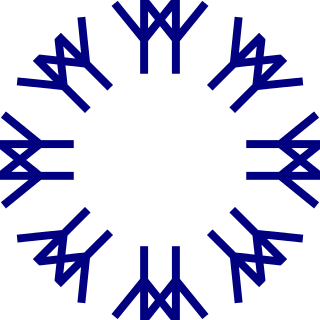
The 1967 International and Universal Exposition, commonly known as Expo 67, was a general exhibition from April 28 to October 29, 1967. It was a category one world's fair held in Montreal, Quebec, Canada. It is considered to be one of the most successful World's Fairs of the 20th century with the most attendees to that date and 62 nations participating. It also set the single-day attendance record for a world's fair, with 569,500 visitors on its third day.

The Bureau international des expositions is an intergovernmental organization created to supervise international exhibitions falling under the jurisdiction of the Convention Relating to International Exhibitions.

The International Exhibition of 1862, officially the London International Exhibition of Industry and Art, also known as the Great London Exposition, was a world's fair held from 1 May to 1 November 1862 in South Kensington, London, England. The site now houses museums including the Natural History Museum and the Science Museum.

Ariel is an Israeli settlement organized as a city council in the central West Bank, part of the Israeli-occupied territories, approximately 20 kilometres (12 mi) east of the Green Line and 34 kilometres (21 mi) west of the Jordan border. Ariel was first established in 1978 and its population was 20,520 in 2022, composed of veteran and young Israelis, English-speaking immigrants, and immigrants from the former Soviet Union, with an additional influx of above 10,000 students from Ariel University. It is the fourth largest Israeli settlement in the West Bank, after Modi'in Illit, Beitar Illit, and Ma'ale Adumim.
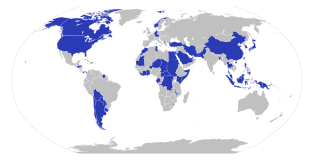
The 1980 Summer Olympics boycott was one part of a number of actions initiated by the United States to protest against the Soviet invasion of Afghanistan. The Soviet Union, which hosted the 1980 Summer Olympics in Moscow, and its satellite states later boycotted the 1984 Summer Olympics in Los Angeles.
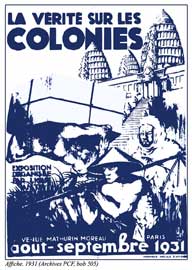
A colonial exhibition was a type of international exhibition that was held to boost trade. During the 1880s and beyond, colonial exhibitions had the additional aim of bolstering popular support for the various colonial empires during the New Imperialism period, which included the scramble for Africa.
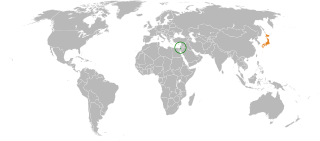
Israeli–Japanese relations began on May 15, 1952, when Japan recognized Israel and an Israeli legation opened in Tokyo. In 1954, Japan's ambassador to Turkey assumed the additional role of minister to Israel. In 1955, a Japanese legation with a Minister Plenipotentiary opened in Tel Aviv. In 1963, relations were upgraded to Embassy level and have remained on that level since then.

Alexander Ezer (Yevzerov) (1894–1973) was a leader of the Zionist movement in Siberia and a proponent of expanding commerce, tourism and industry in both the pre-state Yishuv and the then-newly established State of Israel. Ezer was elected in 1931 to the 3rd Assembly of Representatives representing the Revisionist Party of Ze'ev Jabotinsky, and later served as chief adviser on tourism for the first government of Israel.
The Durban Review Conference is the official name of the 2009 United Nations World Conference Against Racism (WCAR), also known as Durban II. The conference ran from Monday 20 April to Friday 24 April 2009, and took place at the United Nations Office in Geneva, Switzerland. The conference was called under the mandate of United Nations General Assembly resolution 61/149 with a mandate to review the implementation of The Durban Declaration and Programme of Action from the 2001 World Conference against Racism, Racial Discrimination, Xenophobia and Related Intolerance which took place in Durban, South Africa.

Relations between Israel and the Czech Republic, and its predecessor state Czechoslovakia, have varied widely over time.

Expo 2017 Astana was an International Exposition which took place from June 10 to September 10, 2017 in Astana, Kazakhstan. The expo's theme was "Future Energy", and aimed to create a global debate between countries, nongovernmental organizations, companies and the general public on the crucial question: "How do we ensure safe and sustainable access to energy for all while reducing CO2 emissions?"
Durban III is an informal name for a high-level United Nations General Assembly meeting marking the 10th anniversary of the adoption of The Durban Declaration and Programme of Action that was held in New York City on 22 September 2011. It was mandated by United Nations General Assembly (UNGA) resolution 64/148 of 18 December 2009 to commemorate the World Conference against Racism 2001, and given additional form and visibility by a UNGA Third Committee draft resolution adopted on 24 November 2010. It followed the Durban Review Conference, the official name of the 2009 United Nations World Conference Against Racism (WCAR), also known as Durban II.
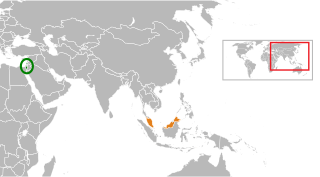
Israel–Malaysia relations refers to the commercial and cultural ties between Israel and Malaysia. The two countries currently maintain no formal diplomatic relations. Although Malaysia officially maintains an outwardly hostile position towards Israel, commercial relations between the two countries do exist, albeit very limited. Malaysian passports bear the inscription: "This passport is valid for all countries except Israel". Israeli Passport holders are forbidden to enter Malaysia without written permission from the Malaysian Ministry of Home Affairs. The recognition of Israel is a politically delicate issue for the Malaysian government.

The Genesis Prize is a $1 million annual prize awarded to Jewish people who have achieved significant professional success, in recognition of their accomplishments, contributions to humanity, and commitment to Jewish values.

The Arab League boycott of Israel is a strategy adopted by the Arab League and its member states to boycott economic and other relations between Arabs and the Arab states and Israel and specifically stopping all trade with Israel which adds to that country's economic and military strength. A secondary boycott was later imposed, to boycott non-Israeli companies that do business with Israel, and later a tertiary boycott involved the blacklisting of firms that do business with other companies that do business with Israel.

Boycotts of Israel are the refusal and calls to refusal of having commercial or social dealings with Israel in order to influence Israel's practices and policies by means of using economic pressure. The specific objective of Israel boycotts varies; the Boycott, Divestment and Sanctions (BDS) movement calls for boycotts of Israel "until it meets its obligations under international law", and the purpose of the Arab League's boycott of Israel was to prevent Arab states and others to contribute to Israel's economy. Israel believes that boycotts against it are antisemitic.
The modern Olympic Games or Olympics, are leading international sporting events featuring summer and winter sports competitions in which thousands of athletes from around the world participate in a variety of competitions. The Olympic Games are considered the world's foremost sports competition with more than 200 nations participating. The Olympic Games are held every four years, with the Summer and Winter Games alternating by occurring every four years but two years apart. In the Olympic Games during the years, despite its approach of "peace through sport", there have been claims of antisemitism, most notably in the Munich Events of 1972, which ended in the death of eleven Israeli athletes. The first official commemoration by the International Olympic Committee in acknowledgment of the event happened in 2016.
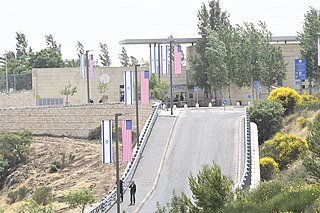
The Embassy of the United States of America in Jerusalem is the diplomatic mission of the United States of America to the State of Israel. It is located in Talpiot, a neighborhood in southeastern Jerusalem. In mid-October 2018, Mike Pompeo, the Secretary of State under the Trump administration, declared that the new embassy would be merging with the Consulate General, through which the United States had maintained diplomatic relations with the Palestinian Authority. Currently, all diplomacy between the United States and the Palestinians is conducted through the "Office of Palestine Affairs" inside of the American embassy for Israel.
References
- ↑ "Israel" . Retrieved 12 September 2019.
- ↑ "1953 Jerusalem" . Retrieved 30 August 2019.
- 1 2 "1953 Jerusalem - Israel". Archived from the original on 16 March 2020. Retrieved 14 March 2012.
- ↑ "Official Site of the Bureau International des Exposition" . Retrieved 15 March 2012.
- 1 2 3 "Exhibition 'Conquest Of The Desert'" . Retrieved 14 March 2012.
- ↑ "Israel's First International Exhibition Opened in Jerusalem" . Retrieved 13 March 2012.
- ↑ "October 16, 1953 Israel's First International Exhibition Closes; Visited by 600,000" . Retrieved 14 March 2012.
- ↑ "U.S. Explains Its Boycott of Exhibition Opening". Archived from the original on 15 April 2013. Retrieved 13 March 2012.
- ↑ "Soviet Declines Invitation to Participate in Israel Exhibition" . Retrieved 14 March 2012.